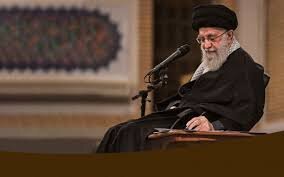Leader’s letter highlighted the ugly face of Western hegemony system

MADRID- Ayatollah Seyyed Ali Khamenei, the Leader of the Islamic Revolution, wrote an open letter on May 30th to American students protesting against the Zionist genocide in Gaza, affirming they are "on the right side of history."
Since late April, protesters have set up camps on over 80 campuses across the United States, demanding that academic institutions sever their financial ties with Israel or companies connected to the Israeli military's war in Gaza. Another one of their demands is for a ceasefire to end the massacre in Palestine, a land described in the letter as "independent, comprised of Muslims, Christians, and Jews, with a long history."
The letter, published on its official website, was addressed to those students whose "awakened conscience has led them to defend the oppressed women and children of Gaza." Ayatollah Khamenei asserts in the letter that the students protesting in the United States have formed a new branch of the "Axis of Resistance" in their support for the Palestinian people, who have been struggling for their freedom for decades.
In this regard, from the perspective of the Islamic Republic, American students share the same political objectives as the Axis of Resistance: to put an end to the brutal Zionist oppression against the Palestinians.
The letter also refers to the history of the conflict between Palestine and Israel, blaming Great Britain and the United States for financially and militarily supporting Israel: "After England's initial support, the United States became the greatest advocate of this usurping regime, consistently providing it with political, economic, and military support. In an act of unforgivable recklessness, the United States even paved the way and provided assistance for the regime's production of nuclear weapons."
According to Ayatollah Khamenei, Western elites have labeled Palestinian resistance as "terrorism" while defending Israel as "acting in self-defense." However, he adds that circumstances have changed, and a "different fate" awaits the West Asian region amid the awakening in favor of Palestine worldwide.
The letter also includes an invitation to read the Quran and to embrace Islam: "My advice is for you to become familiar with the Quran." Additionally, the Leader references Surah Al-Baqarah, citing the verse: "Do not oppress and do not be oppressed."
Following this Islamic perspective, as expressed in Ayatollah Khamanei's letter, one can observe an existential division between oppressors and the oppressed in Palestine. This division also serves to politically distinguish between friends and enemies, with the latter characterized by a complete absence of justice.
Furthermore, the letter serves to show how the supposed antagonism between the liberal system and the repressive response is not as it seems. As the Italian philosopher Antonio Gramsci explained, the liberal system employs both direct coercion and hegemony to generate what is known as popular consent.
Gramsci referred to hegemony as the dominant intellectual, institutional, and moral bases of society - essentially, what is often referred to as the ruling "culture."
When hegemony is no longer sufficient to ensure the people's consent, a crisis of authority occurs, and coercion rapidly increases to allow for the continuation of domination. As Professor Joseph Massad adds, liberal societies, at such times, prefer to adopt Machiavelli's maxim: "it is safer to be feared than loved."
The massive campaign against professors and students in U.S. universities in recent months clearly illustrates this strategy. This means that the defense of these freedoms is guaranteed only when they are not tested. Once dissent from hegemonic ideas threatens the dominant ideology and tests its tolerance, repression occurs in various forms within the university and by external forces, both private and public.
The repression against Massad himself, a professor at Columbia, is explained by the importance of the American university as the main bastion of dominant ideological stability. The fear is that when its own students and professors deviate from the liberal script, this may trigger a domino effect in the rest of the U.S. university system, or even spread to other liberal systems, explaining the repression suffered by professors and students.
Although it is true that the university population does not precisely reflect public opinion, their activism often serves as an indicator of the future in political terms. This is where the political importance of the encampments established in dozens of universities lies. In other words, what is at stake is a change in the hegemonic model where support for Israel in its genocidal campaign is not justified.
This solidarity movement, as acknowledged in the open letter published by Ayatollah Khamenei, is successfully challenging decades of pro-Zionist propaganda in the United States by portraying Palestinians as human beings. Israel has lost the battle for public opinion, and it knows it. The loss of the ability to create public consensus by the liberal system is eliciting a hysterical response, discrediting, delegitimizing, and demonizing the protesters and the professors.
As Massad points out in an article, university administrators, their private and public funders, and their allies in government seem to live under the illusion that they can suppress opposition to the genocide using every possible means, believing that this will quell dissent and maintain unwavering support for Israeli genocide within the elite circles of the U.S. and the West.
The open letter from the Leader addressed to students reflects the erosion of pro-Israel hegemony within American society. According to a survey conducted by the Harvard University Institute of Politics, young people aged 18 to 29 in the United States consider Israel's genocidal war on Gaza after October 7 unjustifiable.
What students and faculty have demonstrated in recent months is that reinstating ideological hegemony has become a lost cause forever. The more coercion governments and university administrations employ, the more that hegemony erodes.
Leave a Comment